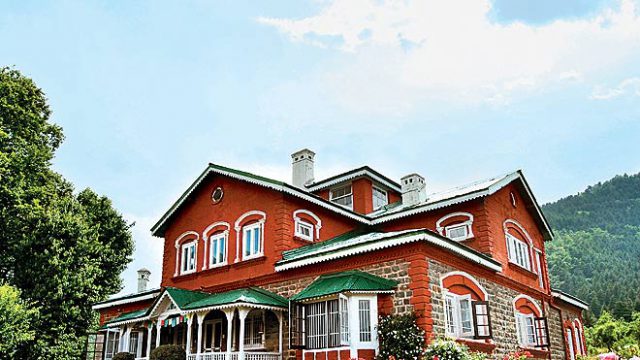I didn’t know how to come back,” Jyoti Singh confides to me as we sit in her garden among vivid zinnias and dahlias, the Dal Lake glinting through the poplars below. It is cool but the morning sun shines sharply and we have to adjust our chairs to see each other. Tibetan prayer flags flutter and wind chimes tinkle on the porch behind us.
She elaborates, “I didn’t know how to come back and not just sit here staring at the lake. How do I engage with the place in a meaningful way? How do I use this space I’ve been fortunate enough to inherit?”
The grandfather of this warm, down-to-earth academic-turned-ceramicist was the last maharaja of Kashmir. The 1920s house she inherited, set in the midst of an orchard that stretches up Shankaracharya Hill, was part of his royal estate. Growing alongside the almond trees are walnut, apple, plum, pear, quince, cherry, mulberry, pistachio and persimmon. “Don’t walk up too high,” I was warned casually as I set off for a stroll, “The bears come down at this time of the year for the apples.” Okay.
In the end Jyoti came back quietly, in mid-2000, offering her home as a space where “people could feel free to tell their stories, in wonderful surroundings very close to the city”. Under the auspices of the Dara Shikoh Trust, which she helped set up, it became a place for seminars and workshops (including, last year, music, theatre, photography, enamelling) and a low-key festival celebrating the rich cultural heritage of Kashmir.
Opening the property as a homestay was an extension of this vision of sharing her space, as well as a way to help it pay for itself. My bedroom is large and comfortably furnished. I plunge my feet happily into its deep carpet (these have been fitted recently in all the bedrooms), and smile at the family of papier-mâchè cats lined up on the mantel over a pine cone-filled grate. Attractive photographs, taken during a workshop, hang on the walls. Fab India throws decorate the beds, and in the evenings — fortunately, for the nights are cold — a warm quilt materialises.
Almond Villa is homestay-cosy but there’s something rather noble about the way its central hall extends up to the full two-storey height of the building. A dark-wood staircase climbs up one wall and then forms a balcony along the other three, supported by carved buttresses. Bhutanese textiles and (workshop-made) enamels hang between these and in the centre of the room is a vast wooden table for communal dining. It’s almost medieval.
Thankfully, there’s nothing medieval about breakfast. I take my seat among the other guests and order porridge and coffee and a masala omelette, while slicing into a juicy apple from a laden fruit bowl. Jyoti has started a jam-making unit with local women so some jam-tasting is in order — the mulberry preserve wins, but it’s a close-run thing. My companions turn out to be fascinating: psychologist RashnaImhasly who has been working for many years with Kashmiris brutalised by the conflict and the intrepid NRI founder-director of the Indo-American Arts Council, holidaying on crutches with one leg in plaster. Food and conversation are both excellent.
Lunch isn’t served but the Almond Villa team is happy to recommend places to find it. Dinners are mixed cuisine and very home-made: a bit of North and a bit of South Indian, hearty soups and baked dishes, mostly prepared using seasonal vegetables grown on the property. Rao, the chef, makes a memorable apple pie: luscious fruit encased in a delicious shortbread pastry.
Jyoti will recommend things to do and help organise expeditions, many off the tourist map: visits to crafts people’s homes and riverside picnics, for instance. There’s a charming handwritten list entitled ‘Tours and Trips: Kashmir’, with details. Horse-riding isn’t on the list but they hope to offer it soon — a trail has already been marked out on the land below the house.
As it’s my first visit to Srinagar, I’m happy to stay on the tourist map: basking in the glory of the giant chinar trees in Shalimar Bagh, conversing with the fairies in Dara Shikoh’s stepped Pari Mahal (which, appropriately, may be seen from Almond Villa), marvelling at the solemn beauty of the Jama Masjid with its towering deodar columns, over 370 of them, each carved from the trunk of a single tree.
Shopping is on my agenda too and for the best quality handicrafts (with accompanying price tags) I head to the old-world shops on the Bund: Asia Crafts and Suffering Moses.
The Dal has many moods. One early morning it is shrouded in a milky mist. I venture out in a shikara just as it begins to lift off its surface like smoke, and enter a world of haunting beauty. As we glide forward, the lake comes serenely to life: fishermen cast their nets, kites swoop around the skies and a Himalayan pied kingfisher dives and rises and turns and dives again. I could sit and stare at the lake for a very long time — it is absolutely entrancing — but I understand why Jyoti wanted to do more.
The information
Location Dal lake, Srinagar, Jammu and Kashmir (about 30mins from the airport)
Accommodation 5 double rooms: 1 classic; 4 premium
Tariff Rs 4,800 (classic); Rs 6,000 (premium) Contact 1-800-4252737, mahindrahomestays.com




